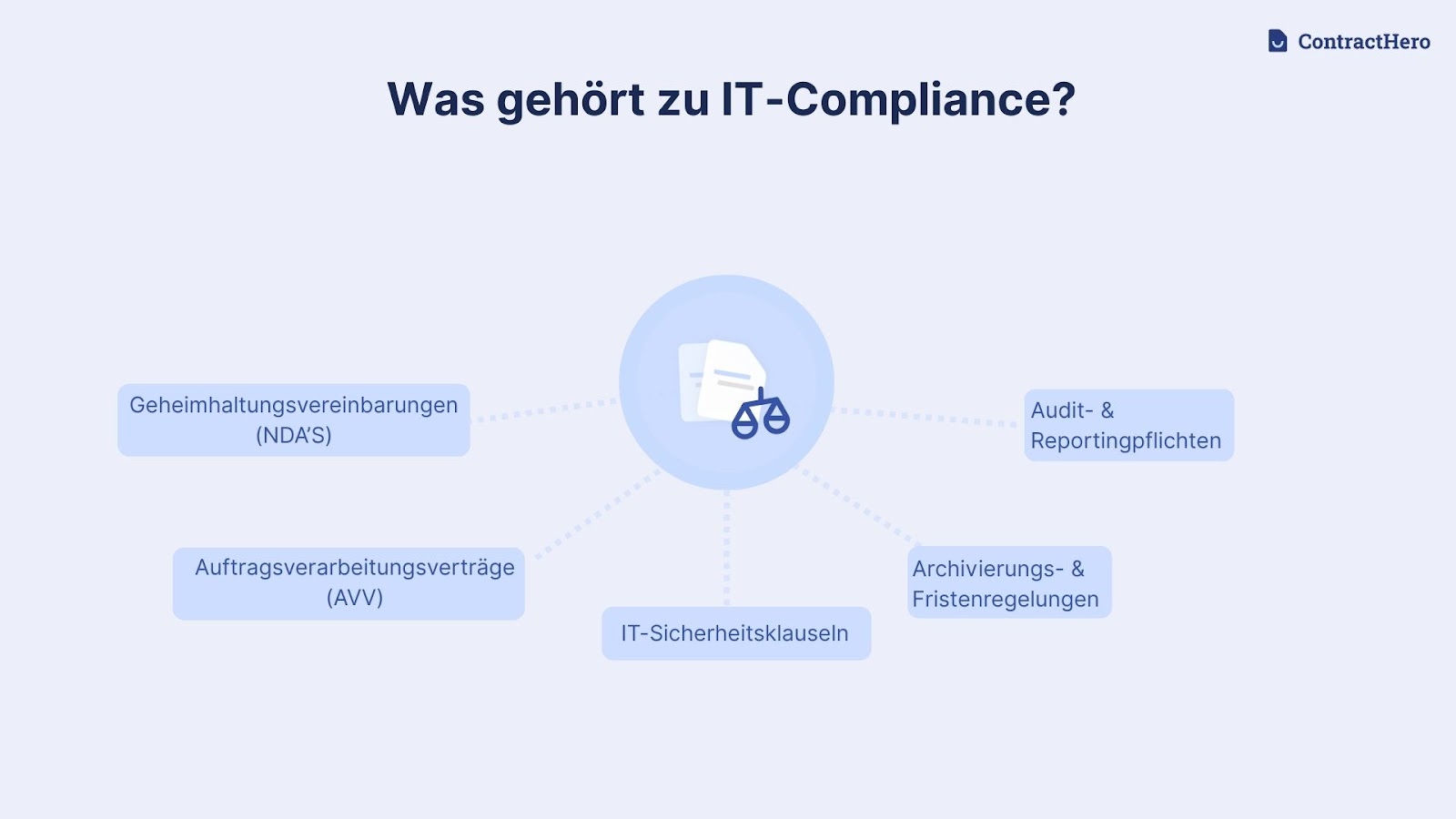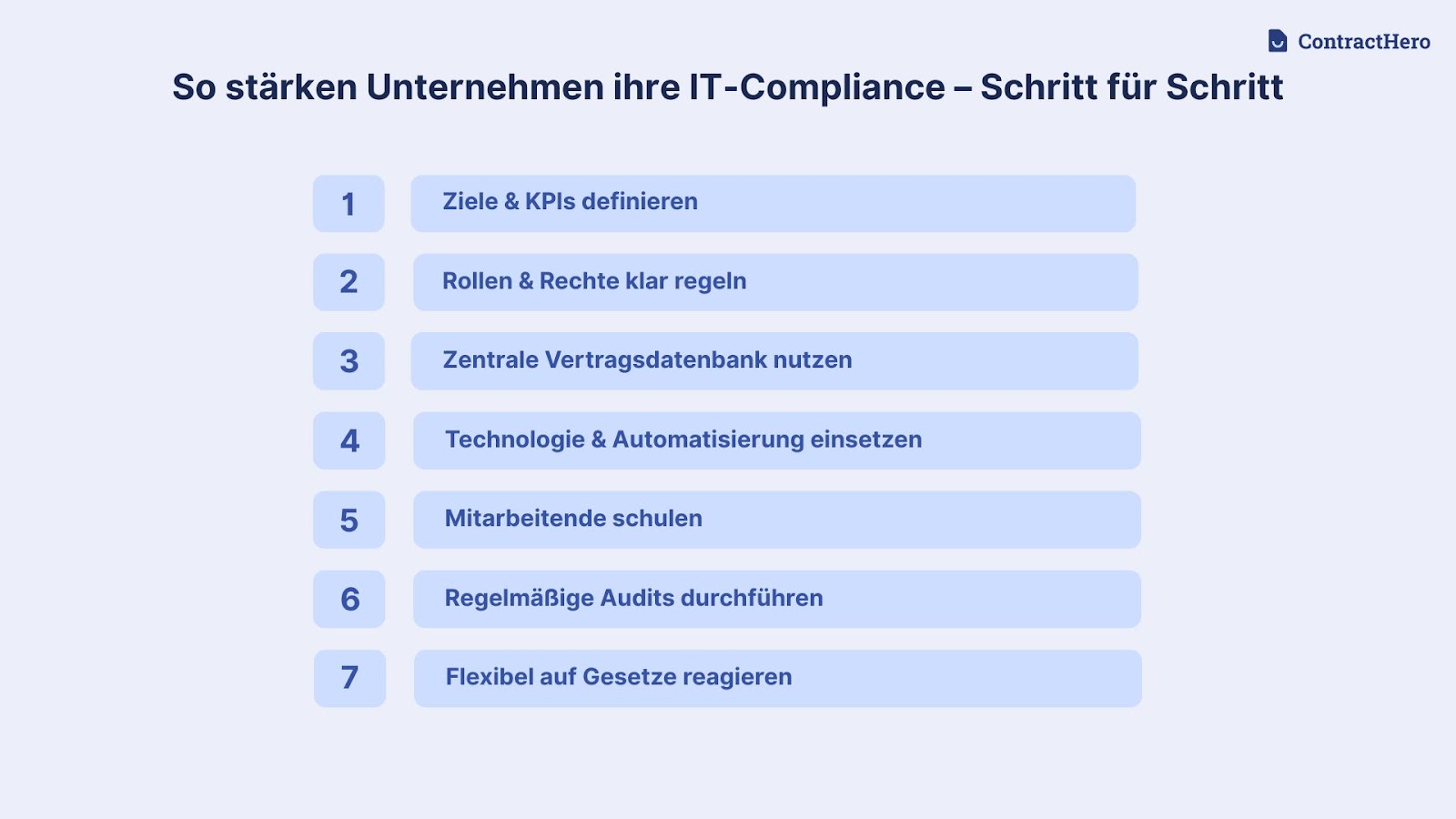
The term IT compliance describes adherence to all legal, regulatory and internal company requirements in the area of information technology. The aim is to ensure that IT systems, digital processes and the handling of sensitive data are legally compliant, secure and traceable.
IT compliance is not an isolated area of responsibility for the IT department, but a holistic management principle. It affects central corporate functions such as data protection, contract management, information security, access management, archiving and risk management - areas that are becoming particularly important in the course of digital transformation.
IT compliance is based on requirements such as GDPR, ISO 27001, GoBD or industry-specific standards. These require traceable data processing, secure authentication, access protection, processing documentation and audit-proof archiving. Contracts with service providers and clear regulations on archiving and deadline control form a central foundation. Digital contract management helps with technical and organizational implementation.
In times of digital processes, cloud infrastructures and networked systems, IT compliance is no longer just an operational tool, but a mandatory and essential part of corporate management. Any violation of legal regulations - e.g. due to unsecured databases, faulty access concepts or outdated contractual clauses - can have legal, financial and reputational consequences.
Studies show*:
*Note: The figures quoted are based on standard industry studies, e.g. by Bitkom and PwC.
IT compliance is therefore not a nice-to-have - but a corporate duty that ensures security, reliability and legal compliance in the digital age.

Compliance management encompasses all organizational measures that ensure compliance with laws, standards and internal regulations. This includes, among other things:
The goal: legal compliance, transparency and lasting trust, both internally and externally.
A compliance officer is responsible for implementing and monitoring the compliance strategy. His or her tasks include Risk analysis, advising the specialist departments, developing guidelines, training and reporting to the management. He is the central point of contact for all compliance issues.
Anyone who does not have their contract processes under control - for example, does not define clear responsibilities, loses sight of deadlines or files contracts in an unstructured manner - risks data protection breaches, unclear responsibilities and therefore non-compliance.
1. fines and legal consequences
According to Article 83, a breach of the General Data Protection Regulation (GDPR) can cost companies up to €20 million or 4% of their global annual turnover - whichever is higher.
2. reputational damage
Misconduct relating to data leaks or questionable IT practices spreads quickly - and has a negative impact on trust, customer loyalty and market value.
3. economic disadvantages
Non-compliance can lead to the termination of contracts, rejection in tenders or exclusion from certain partnerships - with a direct impact on sales.
Violations of IT compliance guidelines occur more frequently than you might think and range from everyday carelessness to serious offenses. A few examples:
All of these violations can result in legal sanctions - from warnings and fines to contract terminations.
Contract compliance means adherence to all contractually agreed conditions - both by the company itself and by external partners. This includes adherence to deadlines, data protection obligations and scope of services. Digital contract software can automatically detect deviations and inform those responsible at an early stage.

Sustainable IT compliance management relies on processes, responsibilities and, above all, tools. Here are some best practices:
Only those who have measurable goals - e.g. meeting deadlines, audit quota or access hits - can improve their compliance.
Unclear access rights harbor enormous risks. Tools such as ContractHero make it possible to define read and write permissions at contract level - individually and audit-proof.
A structured database creates an overview, enables deadlines to be monitored and protects against data loss - especially when employees change.
4. automation & use of technology
OCR text recognition, automatic deadline warnings and contract scoring reduce errors and significantly increase compliance quality.
Compliance only works if employees know how and why they should implement it. Training and checklists are essential here.
Regular audits uncover gaps in contract documentation, access management or compliance with legal requirements and prove conformity to business partners or authorities.
Agile contract management ensures that new requirements are implemented quickly - including digital signatures and automated workflows.
Tools to support IT compliance
Modern contract management software forms the basis for IT compliance in practice - e.g. through:
The result: fewer risks, less manual effort - and a reliable system for adhering to all relevant compliance requirements.
Conclusion
IT compliance is more than just IT security - it affects all digital processes in the company. Those who approach it strategically not only protect sensitive data, but also strengthen trust, minimize risks and ensure the long-term success of the company.
With the right structure, clear responsibilities and a digital solution like ContractHero, IT compliance goes from being a mandatory program to a competitive advantage.